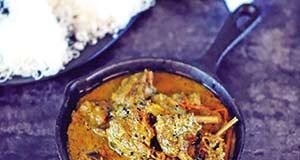
You’ve rid your kitchen of plastic utensils and replaced them with olive wood chopping boards, beech spatulas and spoons. But there’s an art to taking care of these implements so that they stay in good shape and last as long as possible.
Here are the dos and don’ts – from an array of experts – for keeping your wooden utensils in peak condition, so that they’re a part of your kitchen for years to come.
Know your wood
Always choose a hard-wearing wood that will stand up to kitchen use. “Hardwoods are usually best for boards and utensils: beech, maple and walnut,” says furniture-maker Chris Holland. “They have got a tight grain, which means less moisture and dirt can get in, and they resist deep knife marks better. Olive wood is another good choice – it’s beautiful, naturally oily, and resistant to staining – but it’s quite hard, so it can dull knives quicker. Ash is tough and light, but has a more open grain, so it needs regular oiling to keep moisture out.”
Avoid the dishwasher
Whatever tree they come from, the first rule of looking after wooden kitchen items is probably the most frequently broken. “Don’t put them in the dishwasher,” says Holland. “It will strip off any protective treatment straight away.” The water temperature in a dishwasher rises to a point where it’s in effect steaming the wood. The result, Holland says, is that the wood expands, with any protective oils in the fibres washed away.
To clean chopping boards, spoons, spatulas and so on, simply hand-wash in warm water with a gentle washing-up liquid. Avoid scrubbing too hard with a scourer and don’t use abrasive cleaning products. Dry off any excess water immediately with a tea towel.
For an extra clean, says Jo Hadlow-Davies of Pembrokeshire-based Edge Handcrafted Tables and Furniture: “Rub a slice of lemon over a chopping board that has been used for something with a strong flavour, such as onions, to get rid of those odours before washing.”
Store well
Leave chopping boards on their long edge to avoid warping, and allow them to dry fully before you reuse. For utensils, stand them up in a pot to dry, and make sure there is no part left sitting in water.
One man grinding Spices<br>A man is grinding spices with a mortar and pestle. Kitchenware and other spices (oregano, paprika, red pepper, black pepper, cinnamon sticks, cardamon, cloves) are placed at the table. Taken on 7.29.2016 in the US, Portland, OR.
‘Hands down my favourite bit of kit’: 13 kitchen gadgets top chefs can’t live without
Nourish and protect
Wooden utensils can become tired and fluffy after a while, with the wood fibres catching on your tea towels, for example. When this happens – or, preferably, before it does – use a treatment to nourish and protect it.
Anything you put on the wood must be food-safe, and you don’t want it to alter the flavour of your food. “You can use olive oil [now and then], but you should only do this with items that you use and wash every day,” says Hadlow-Davies. If not, you could end up with a board that starts to go rancid.
For less frequently used items, a longer-lasting treatment is better. All the treatments below are suitable for all woods (though you may want to test on a small area to check if it will affect the colour). You can repeat whenever necessary – once a month should be sufficient, but if you use items often or they start to look a little dry, you can always increase the frequency.
“Whatever [treatment] you use, washing will wear it away over time, so the only way to keep the wood properly protected is to reapply it,” says Holland. “A light sand and re-oil every so often will keep it looking good and lasting longer.”
 Weekly Bangla Mirror | Bangla Mirror, Bangladeshi news in UK, bangla mirror news
Weekly Bangla Mirror | Bangla Mirror, Bangladeshi news in UK, bangla mirror news







